The UN recently released their report on AI, written by the members of the United Nations Secretary General’s High-Level Advisory Board on Artificial Intelligence. This report outlines seven key recommendations for the UN's role in ensuring AI's benefits outweigh its risks and costs.
Recommendations
- Create an international scientific panel on AI
- Set up twice-yearly intergovernmental and multi-stakeholder policy dialogue on AI governance on the margins of existing meetings at the United Nations
- Create an AI standards exchange
- Set up a capacity development network
- Establish a global fund for AI
- Create a global AI data framework
- Set up a small AI office within the Secreteriat, reporting to the Secretary-General, that'll act as the glue that supports and catalyzes the recommendations made in the report
The report is worth a read, especially if you want a snapshot on the current discourse on AI at the national and international levels.
Some of these recommendations are expected (e.g., let's agree to get together twice a year, let's establish a team / office to coordinate the various UN x AI activities) and others are a bit more interesting to me (e.g., scientific panel, a global data framework).
A few things in particular stood out.
An International scientific panel on AI
According to the latest report, we are not on track to meet the SDG targets. Of the 169 targets, only 135 have sufficient data to even measure our progress. And of those, only 17% are on track. Yikes.
That's why I'm encouraged to see that the first recommendation is to establish a scientific panel to explore how AI could help make progress towards the SDG targets and on exploring the capabilities and risks of AI more broadly.
However, I hope that this effort goes beyond writing research reports. While there is a lot of value in capturing lessons learned and sharing it with others, we need to make sure that we're learning by doing and not just by talking to each other.
Peter Singer writes:
He goes on to say:
We need to foster more innovation in critically underserved areas (perhaps we should start by looking at the 18% that are showing stagnation or the 17% that are regressing), support their efforts in reaching their target populations, shine a light on their work, help with knowledge / tech exchanges, and support ways to replicate and/or scale1 their solutions.
AI x SDGs
Unsurprisingly, experts believe that high / upper-middle-income countries are more likely to accelerate scientific discoveries, increase economic activity, and make progress on the SDGs.
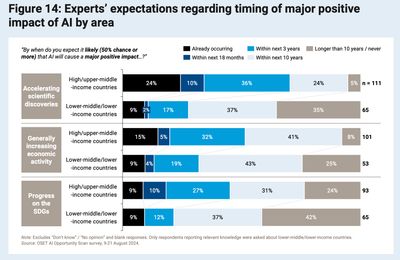
It's sobering, however, to see that 42% of expert respondents believe that it'll take longer than 10 years (or never!) for AI to make a positive impact on the SDGs.
Experts were asked for their thoughts on the barriers that lower-middle / lower-income countries faced, and poor tech / communications infrastructure ranked at the top of the list.
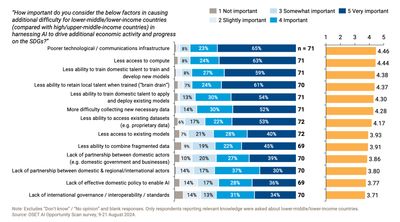
This unfortunately makes sense. When I worked on extending the reach of digital financial services to rural frontier areas when I was at the Gates Foundation, we constantly bumped up against spotty cell phone coverage and unreliable electricity.
We know that internet access is still unevenly distributed around the world.
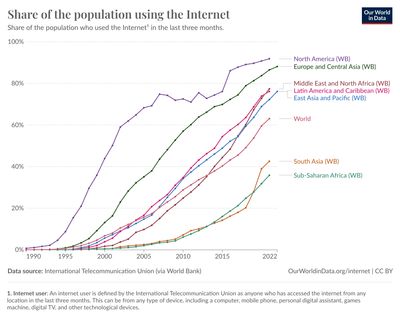
Smartphone use still lags in lower middle-income and lower-income countries. We also see a big portion of Sub-Saharan Africa still using basic or feature phones (World Bank's Digital Progress and Trends Report 2023).
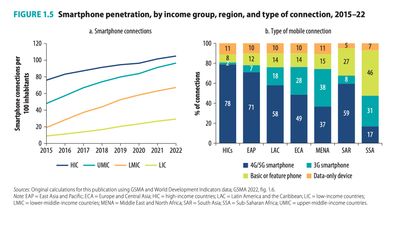
A recent report by Digital Green's Farmer Chat solution highlights that even when coverage is there, the cost of data is still a barrier in using and taking advantage of digital solutions.
If we are to realize the promise of digital development solutions, we need to (a) invest in critical infrastructure and (b) design for this reality (no/low connectivity environments, low capability devices, affordability).
Quick Hits
Ok. Time for a lightning round.
On Risks
Experts are primarily concerned around two types of risks:
- Societal Implications of AI (damage to information integrity; inequalities arising from differential control and ownership of AI technologies; discrimination / disenfranchisement, particularly against marginalized communities)
- Intentional use of AI to harm others (intentional use in armed conflicts by state and non-state actors)
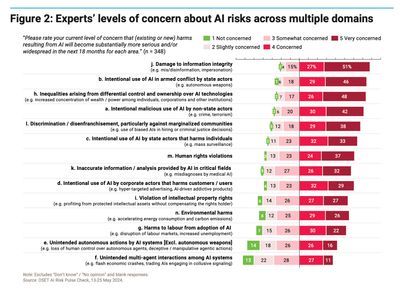
Representation
There are a bunch of AI governance initiatives to date, but representation at the country level is heavily skewed and exclude entire parts of the world.
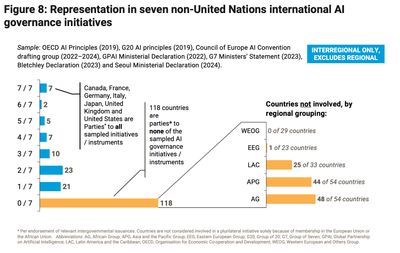
Seven countries (Canada, France, Germany, Italy, Japan, UK, and the United States) are part of all seven identified AI governance initiatives. In contrast, 118 countries are not involved in any of these, most coming from Latin America, Africa, and Asia.
Global Data Framework
The report calls out the problem of missing data, which has implications for relevancy, context, and utility in key areas around the world. They recommend incentivizing the development of critical datasets in SDG-relevant domains, which is helpful when you remember that 34 targets are still missing data that's needed to even see how we're doing.
It'll be important to go beyond national level statistics. That's helpful for monitoring progress, but if we want to influence the development of these LLMs, we'll need much more relevant and specific data.
The recent report on Digital Green's Farmer Chat solution provides a good overview of the different datasets they incorporated into their knowledge base.
I can imagine philanthropies playing a critical role in this opportunity area, both by funding open data sets in critical areas as well as working with grantees and partners to create open data sets from existing, funded work.
Parting Thoughts
I just came back from the launch event of the Digitalist Papers. Supported by Project Liberty, Stanford's Digital Economy Lab and Institute for Human-Centered Artificial Intelligence brought together experts from multiple fields to explore AI and democracy in the US. It was an incredible experience, and I'll share some thoughts on it soon.
USAID and the U.S. Department of State launched the Global AI Research Agenda and AI in Global Development Playbook.
Putting in a note here so that we can come back to discuss what scale means in international development. The main beats are: (a) there isn't a common definition for scale, (b) people underinvest in what it takes to scale development interventions, and (c) people have an overly optimistic perspective on what it takes to scale interventions. OECD is writing a set of scaling guidelines and is looking for comments now: https://oecd-opsi.org/blog/who-doesnt-like-scaling/